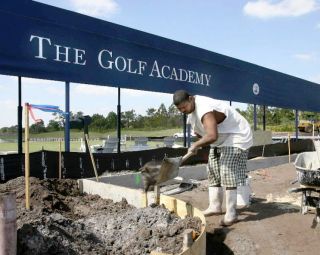|
Article Courtesy of The Orlando Sentinel By Mary Shanklin Published February 26, 2011 The polished halls of some local country clubs could soon smell of takeout pizza or echo with the sounds of a day-care center, as foreclosed golf courses change hands and new owners look for ways to make money with them. "The recession has impacted golf courses across the country and the golfing industry as a whole," said Gene Garrote, president of Celebration Golf Management, which has purchased five local courses in the past three years. His firm is talking with pizza-delivery companies about setting up shop in Stoneybrook West and is exploring a lease for a day-care center there. It's building a junior golf academy in Celebration, and adding classes that appeal to children and wives at the Golden Bear Club in Keene's Pointe. Even the pastry-laden menu at the Golden Bear has gotten a gluten-free makeover, in hopes of boosting restaurant sales. And night golf has made it to several courses.
based in Jupiter. In December alone, 12 percent fewer rounds were played in Orlando than a year earlier. In recent years, Heathrow Golf and Country Club in Lake Mary, Bella Collina in Montverde, Sanctuary Ridge in Clermont, and Windermere Country Club have all faced financial problems or foreclosure. Bridgewater in Lakeland was reorganized as part of a Chapter 11 bankruptcy and is on the market. Windermere, Bella Collina and Bridgewater have all been looking for buyers. "I tell sellers: 'You can expect offers to be half what you're asking,'" said golf-course sales specialist Kathy Bissell of Jacksonville. "Plenty of bank-owned properties [are] selling for 20 to 30 cents on the dollar." Right now is the time to buy, added Bissell, who is marketing 18-hole courses with starting prices of less than $1 million. A few years ago, golf-course analysts said "Build it and they will come," said Hilda Allen, a longtime golf-course real-estate agent based in Adel, Ga. Allen last year helped negotiate the sale of the Timacuan Golf Club in Lake Mary, and last month she sold Kissimmee Oaks Golf Course for $2.2 million. "Florida was overbuilt, and there's a lot of golf courses that have been changing hands," Allen said. And with lenders unwilling to finance most deals, cash is king, she added. Garrote said his financing comes from local partners who reinvest in the properties after acquiring them. Since he formed Celebration Golf Management in 2007, the group of partners has purchased Legends Golf & Country Club in Clermont, the Golden Bear Club near Windermere, Kings Ridge in Clermont, Stoneybrook West in Winter Garden, and Celebration Golf Club in Celebration. In most of those cases, the courses were still owned by developers in the final stages of building out the surrounding community — and owning a golf course wasn't in their plans, Garrote said. "There is lots of fear about the unknown," Garrote said of residents' reaction when informed that their country club has been sold. "What's going to happen? The Golden Bear Club at Keene's Pointe is a good example: It's a great community, and homeowners have invested lots of money, and people worry what will happen to the club." Homeowners in golf-course communities sometimes fear that new owners will build houses on the fairways and greens, though Garrote noted that, at least in some cases, deed restrictions require that the courses be used only for golf. Without turning them into neighborhoods, golf courses can still be successful. "I think our industry is like any other," he said. "We have to change with the times and be creative." Fore example, Celebration Golf has brought in local bands for evening social events, during which the course's management can sell food and beverages. And in both Celebration and Clermont, the company has introduced a new experience: nighttime rounds played with flashlights, golf balls that glow and illuminated flagsticks at each hole. |
